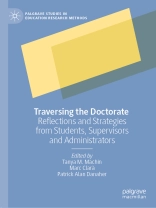This book explores the multiple ways in which doctoral programs are traversed by students, supervisors and administrators. Rather than proposing a single, homogeneous approach as the most effective form of doctoral education, the editors and contributors focus on the diversity of global approaches to the doctorate, including doctoral experiences from Australia, Finland, Chile, New Zealand and Spain. The doctorate emerges from this analysis as a highly complex, heterogeneous and situated phenomenon that resists easy solutions. Strategies that are successful in traversing the doctorate are found to be grounded in contexts that cannot necessarily be generalised to other situations: in doing so, the authors emphasise the importance of presenting a diverse array of experiences and stories. The separate and shared perspectives of doctoral students, supervisors and administrations are mapped and analysed in ways that bring their voices compellingly to life: this book will be of interest and value to students and scholars of the doctoral journey, as well as of international and comparative education.
Daftar Isi
Chapter 1. Traversing the Doctorate: Situating scholarship and identifying issues; Tanya M. Machin, Marc Clarà and Patrick Alan Danaher.- Chapter 2. Conceptual review of digital competences for doctoral supervision; Guillermo Bautista Pérez and Anna Escofet.- Chapter 3. Confirmation of candidature: An autoethnographic reflection from the dual identities of student and research administrator; Cristy Bartlett and Douglas Eacersall.- Chapter 4. Communicating ‘success’ with research students: Institutional responsibilities in encouraging a culture of research higher degree completions; Mark Emmerson.- Chapter 5. A picture of the research field of doctoral education from the students’ perspectives: studies using questionnaires and scales; Maria Cerrato-Lara, Montserrat Castelló Badia and Kirsti Lonka.- Chapter 6. Engineering the doctorate: Designing a highway to traverse; Jay Somasundaram and Prue Howard.- Chapter 7. Research on doctoral supervision: What we have learnt in the last 10years; Gabriela González-Ocampo and Montserrat Castelló.- Chapter 8. Doctoral supervision as a relational endeavour: A pedagogical commitment and reciprocal growth; Nona Press, Dolene Rossi, Coralie Graham and Patrick Alan Danaher.- Chapter 9. Shifting players: Supervision changes during the Ph D journey; Jennifer Tatebe.- Chapter 10. Writing regularly as a thesis-completion strategy; Brian Martin.- Chapter 11. Tiptoeing around the institution? Doctoral supervision in the knowledge economy; Atholl Murray and Cecily Jensen-Clayton.- Chapter 12. Creating a community of practice in a practice-led Ph D; Sarah Peters and Janet Mc Donald.- Chapter 13. Looking for, learning from and finally becoming the voice of experience: A communities of practice perspective on the doctoral journey; Aastha Malhotra.- Chapter 14. Supervising at a distance: The transformation of assistance during a doctoral journey across different continents; Bernadita Justiniano, Teresa Mauri and Marc Clarà.- Chapter 15.Experiencing the journey together: The role of social support during the doctorate; Tanya M. Machin and Renée L. Parsons-Smith.- Chapter 16. You’re my anchor and my sail: A metaphor for a successful supervisor/supervisee relationship; Jennifer Donovan.- Chapter 17. The effects of unsupportive supervision on doctorate completions; Robert Templeton.- Chapter 18. A transforming researcher: how did I get here? The life of a first-year student undertaking the Doctor of Education; Clayton Lawrence.- Chapter 19. Staying on track: A targeted approach to managing the Ph D jourey; Joanne Doyle.- Chapter 20. Strategies for Ph D completion: A critical reflection by completed Ph D candidates; Jessica Z. Marrington and Evita March.- Chapter 21. Traversing through reversing: using doctoral studies to juxtapose research with practice; Lindy Kimmins.- Chapter 22. Depression, doctorates and self; Robert Templeton.- Chapter 23. Exploring the transition between doctoral student and early career academic: Anew perspective on activity systems; Kevin Larkin.
Tentang Penulis
Tanya M. Machin is Lecturer in Psychology and Counselling at the University of Southern Queensland, Australia. Her research focuses on social media, developmental psychology and research ethics.
Marc Clarà is a Serra Húnter Fellow at the University of Lleida, Spain. His research interests include teachers’ reflection, teachers’ emotions and decision-making, and dialogic educational interaction, especially collective inquiry.
Patrick Alan Danaher is Acting Dean of the Graduate Research School at the University of Southern Queensland, Australia. He is also an Adjunct Professor in the School of Education and the Arts at Central Queensland University, Australia, and Docent in Social Justice and Education at the University of Helsinki, Finland.












